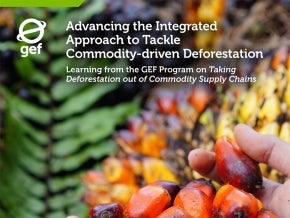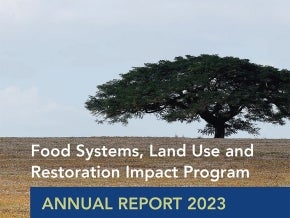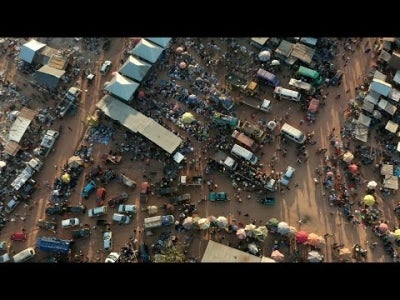
A passion for the land
Something remarkable is on the rise in the Horn of Africa. Despite a long history of political conflict and tough economic and climatic conditions, inspired Eritreans have been putting their shoulders to the wheel and working proactively to restore life to their damaged land. One such person is Gebremichael Gebremeskel, a farmer in his late sixties living in Adi Abzage village in the foothills of the Tsilima Mountains. Gebremichael has tended the land for over 30 years – he keeps a few dairy cows and grows a variety of crops, including barley, sorghum, wheat, and vegetables. He is a community activist with a passion for good environmental stewardship. Gebremichael says, “It is my dream to turn this place into a paradise.”
To realize this dream, Gebremichael voluntarily introduced soil and water conservation measures on his government allocated plot, as well as on marginal and abandoned communal land, and reclaimed it for agricultural production. He also championed a share-cropping arrangement, through which he restored productivity to previously abandoned plots whose owners were unable to farm themselves – this boosted their food security and brought more land under sustainable management.
Gebremichael says that when he started this, his neighbours thought he had ‘gone crazy’, but, after years of applying a landscape approach to managing his land, he demonstrated how soil and water conservation measures nursed the land back to health and restored productivity to his fields. He is now recognized as a champion farmer who has won awards, and the admiration of his community.
It is this kind of determination, rooted in a deep connection with the land, that has provided fertile ground for sowing the seeds of Sustainable Land Management (SLM) in Eritrea – a process in which Gebremichael is a leading light.
Sowing the seeds of sustainability
On the outskirts of Asmara, the capital of Eritrea, is the Serejeka sub-zoba (sub-region) – a vast dryland ecosystem that was previously laid bare by overgrazing and deforestation. This area supports about 11,000 households in 28 villages. Ten years ago, rapid population growth had contributed to unsustainable practices such as cultivation of marginal lands on steep slopes with easily erodible soils. Livestock roamed the hills and plains in search of food, and people desperately searched for wood to use for cooking and heating. People were hungry – for food, and for new ways of meeting their needs.
With support from UNDP and GEF finance, the Government of Eritrea initiated a pilot project in 2009 to reclaim land productivity and protect fragile ecosystems in the Serejeka subzoba, by building capacity for the implementation of sustainable land management practices. Working through community committees, the project provided practical training in sustainable land management practices, with a focus on forest restoration and sustainable rangeland management. Important aspects of the work were the introduction of land-use zonation, integrated rangeland and water management, and the use of marginal lands to establish forest patches, from which farmers could earn additional income through the sale of timber.
The change in the Serejeka landscape has been remarkable. Hills that were bare have been re-forested. Grass that grows beneath the tree layer is used by communities to feed their livestock in the dry season, and bees – which had always provided a reliable source of food in the form of honey, but had disappeared – have returned to the reforested ecosystem. With the introduction of measures to improve soil fertility, prevent erosion, and use water efficiently – including irrigation from a newly-built micro-dam – farmers now grow vegetables such as tomatoes, spinach, kale, and potatoes, providing food for their families and a reliable source of income through sales at the market.
Building on the strength of this project, SLM is now being expanded into other regions, such as the Tsilima Highlands and Plains.
Re-filling Eritrea’s food basket
The Tsilima Region – where Gebremichael lives – is part of the densely populated Central Highlands agro-ecological zone of Eritrea. This is the ‘breadbasket’ of the country, and is the focus of the government’s current and future investments in food security. But the breadbasket had, over the years, been growing ever-emptier. Despite the relatively fertile soils, agricultural productivity had progressively declined as a result of increasing population pressures, unsustainable land and water use, and the effects of climate change (less rain, falling in shorter and more intense rainy seasons and resulting in increased run-off). Farmers like Gebremichael understood well the importance of adopting more sustainable and integrated measures for managing soil and water resources at catchment level.
He points out, “The mountain is a watershed, so protecting it has huge benefits on the farm land downstream. By strengthening the highlands against wind and water erosion, we protect our fields from erosion as well.” Voluntarily, he invested a significant amount of time, and some money, into filling in gullies and terracing the hillsides closest to his fields, to reduce excessive run-off, improve the ability of the soil to retain moisture, and combat landslides on the steep hillsides. He also planted trees upstream of his arable fields to act as a buffer against the wind and reduce the impacts of water run-off. Every few years, these trees can be harvested and sold, but while they stand, they provide important cover to prevent erosion and serve as windbreaks on the dusty plains. To raise awareness among the community in Adi Abzage and surrounding villages, Gebremichael donated 2,000 Nakfa (about US$130 – a significant sum in Eritrea) of his own money to organize a farmer field visit so that others could learn from his model.
To re-fill Eritrea’s food basket, these measures need to be taken to scale across the landscape. As Gebremicheal notes, “The community is ready to take up these practices, especially the women, they just need to be taught how to do it, and see the evidence for themselves … age and gender won’t stop anyone!”
This is being facilitated by a project to mainstream climate risk considerations into food security in the Tsilima plains and upper catchment areas. Building on the types of soil and water conservation measures pioneered by Gebremichael, the project is working with communities to improve watershed management, restore groundwater recharge, and adopt climate-smart crop and livestock management systems.
Bumper futures
Eritrea’s investments in restoring the country’s degraded landscapes are starting to pay off. Many of Gebremichael’s neighbours and other farmers who have now taken up sustainable land management measures, are seeing the results of restoration activities on their farms. With unshakeable confidence, Gebremichael exclaims, “We can feed ourselves here, if we all invest in the land. This year we only managed to harvest about 3,000 quintals (300 tons), but I can guarantee you that if every farmer here takes up these practices, we can produce over 12,000 quintals (1,200 tons). All farmers need is a little support with skills, tools, and minimal inputs, and they will transform the landscape.”


